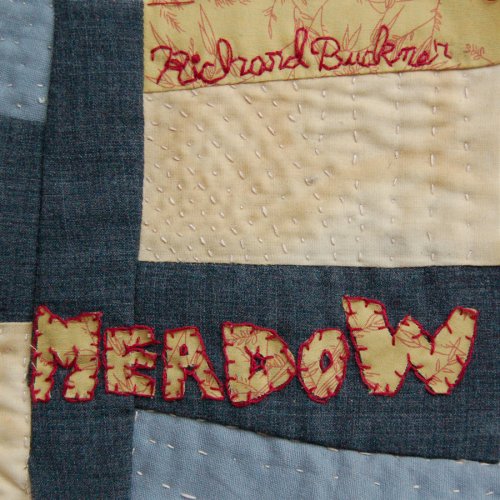
“Pretty destroyed/comin’ through/sees your spin/around the room…are you sitting down?” These are some of the lyrics from “Town,” the opening track on Richard Buckner’s Meadow, sung to an urgent progression of distorted electric and acoustic guitars and drums. As unsettling as this is, the song is chock-full of Buckner’s inherent melodic sense, and it’s easier to bear, somehow, this darkness and melancholy. Produced by J.D. Foster at his home studio, and at Buckner’s, with some additional work done at Brooklyn Recording, this is an album of absences, of ghosts so far down the highway only their traces remain. Buckner’s sense of rock & roll is infused with images from country, folk, the desert, the blues, early American popular music; virtually everywhere he’s been. In some ways one can say that these ten songs are his own companion to his recording of some of the Spoon River Anthology on Hill. Each track here has a one word title except for the final one, “The Tether and the Tie.” But Buckner’s revisiting the cautious grief and optimism on Bloomed, too. Everything here is written in a state of absence, of the previous, the past, and how it can be reconciled. The gorgeous shimmering piano, drums and guitars intro on “Lucky” ease into the startling words: “Forgetting where the roads align, bowing out and back again/Something made it over/A chance to cross the shards you see….” These lyrics are held together by bridges and refrains that further underscore their poetry. Its strength is in the missing middle, the hole in the middle, the thing that needs to be revisited but can’t quite be because it’s already gone and only gray shadows remain.
This small group of players — Foster (Green on Red, Dwight Yoakam, Alejandro Escovedo), Buckner, Doug Gillard (ex-Guided by Voices), Rob Burger (Tin Hat Trio), Steve Goulding (Waco Brothers, Mekons, Freakwater, et. al), and Kevin March (Jeff Buckley, Guided by Voices) — focus on Buckner’s melodies from the outside in. This is not music that tries to break out, it simply tries to hold itself together, and it does so beautifully. Where Buckner opens with what would, to others, be the beginning of the end: “Man, I was high/stepping out on goodbyes/And Once in a while/I’d stumble out into the open…All I thought was, ‘How can I find it?’,” the band covers him, they’re in close, giving him just enough room to sing. He’s on top of them confessing, letting it all fall out, but only because he has this intensely focused support and empathy. Musically, Meadow is perhaps Buckner’s least formal album, though Since is a close second. Often what’s happened on his albums, such as on Dents and Shells, or even the criminally underrated Devotion + Doubt, is that the darkness is rendered impenetrable by the instrumentation. Not so here. The symbiotic relationship these players have to the material and the singer takes it all further. You want to flinch when hearing these observations of a life broken further by its insistence on not hiding its brokenness and its poverty of ability to cement relationships, though not in spirit or heart which never quite gives up hope even as it surrenders one pairing, one grouping after another. No one writes love songs like these. They’re funeral pyres adorned in fragrances, flowers, mementoes and rock & roll.
The hinge piece here is “Kingdom”: “Kingdom calling, don’t you want to come and hide/All the way to the other side?…What’s lost, I knew but I thought couldn’t be/all the time and everything…Downtown, let down, at the bottom of the lights/stray back, although/It’s just too far the way we are….” One is reminded of the musicality of Robert Creeley’s poems and the muscularity of Charles Olson’s. But these songs are neither; they’re infused by poetry but not of it. Meadow is not separate from Buckner’s voice or his catalog, but it is fully inhabited by both. This is a culmination, a stepping stone to who knows where? In the final track where, sparsely accompanied, in his finest, most gentle voice, he croons near the end: “Something serves you right/Haven’t you seen it move?/Always gone and almost new.” There is no paradox here, just the embrace of what has passed being ever before us, haunting and moving with us like our shadows, into whatever comes next. Meadow is a new high-water mark.
Tracks
1 Town 4:08
2 Canyon 3:07
3 Lucky 3:26
4 Mile 3:41
5 Before 2:23
6 Window 3:07
7 Kingdom 3:01
8 Numbered 3:28
9 Spell 3:33
10 The Tether and the Tie 3:51
